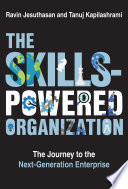

Skills mapping is the process of identifying and documenting the skills possessed by employees within an organization. This idea emphasizes the need for organizations to have a clear understanding of the skills available in their workforce. By mapping skills, organizations can identify gaps, leverage existing talents, and align employee capabilities with strategic goals. This process not only enhances workforce planning but also aids in talent development, recruitment, and succession planning. Organizations that prioritize skills mapping can better adapt to changes in the market and ensure they have the right talent in place to meet current and future demands.
Continue readingA skills-driven culture is one where continuous learning and skill development are embedded into the organizational ethos. This idea highlights the importance of fostering an environment that encourages employees to pursue skill enhancement actively. Organizations can achieve this by providing access to training programs, workshops, and mentorship opportunities. A skills-driven culture leads to higher employee engagement, retention, and overall productivity. It also positions the organization as an attractive employer, appealing to top talent who value professional growth and development.
Continue readingThis concept focuses on the alignment between an organization’s strategic objectives and the skills of its workforce. Organizations must ensure that their employees possess the necessary skills to execute their strategic plans effectively. This alignment can be achieved through targeted training programs, hiring practices, and performance management systems that emphasize skill development. By aligning skills with strategy, organizations can create a more agile workforce capable of responding to market changes and driving innovation.
Continue readingTechnology plays a crucial role in facilitating skill development within organizations. This idea emphasizes the use of digital tools, platforms, and resources to enhance learning experiences. Organizations can leverage online learning platforms, virtual reality training, and AI-driven assessments to provide personalized learning experiences for employees. By integrating technology into skill development initiatives, organizations can ensure that training is accessible, efficient, and tailored to the individual needs of employees, ultimately leading to a more skilled workforce.
Continue readingLeadership is integral to fostering a skills-powered organization. This idea underscores the responsibility of leaders to champion skill development initiatives and create an environment that prioritizes learning. Leaders should model continuous learning behaviors, provide support for skill enhancement, and recognize employees' efforts in developing their skills. By taking an active role in promoting skill development, leaders can inspire their teams to pursue growth opportunities and contribute to the organization’s overall success.
Continue readingMeasuring the impact of skills on organizational performance is essential for understanding the return on investment in skill development initiatives. This idea highlights the need for organizations to establish metrics and KPIs that assess how skills affect productivity, employee engagement, and overall business outcomes. By analyzing this data, organizations can make informed decisions about future training investments, identify high-performing employees, and refine their talent management strategies to maximize the impact of skills on performance.
Continue readingCollaboration and knowledge sharing are vital components of a skills-powered organization. This idea emphasizes the importance of creating channels for employees to share their skills and knowledge with one another. By fostering a collaborative environment, organizations can enhance innovation, problem-solving, and overall performance. This can be achieved through cross-functional teams, mentorship programs, and collaborative platforms that encourage employees to learn from each other and leverage their collective expertise.
Continue readingThe reading time for The Skills-Powered Organization depends on the reader's pace. However, this concise book summary covers the 7 key ideas from The Skills-Powered Organization, allowing you to quickly understand the main concepts, insights, and practical applications in around 24 min.
The Skills-Powered Organization is definitely worth reading. The book covers essential topics including The Importance of Skills Mapping, Creating a Skills-Driven Culture, Aligning Skills with Organizational Strategy, providing practical insights and actionable advice. Whether you read the full book or our concise summary, The Skills-Powered Organization delivers valuable knowledge that can help you improve your understanding and apply these concepts in your personal or professional life.
The Skills-Powered Organization was written by Ravin Jesuthasan, Tanuj Kapilashrami.
If you enjoyed The Skills-Powered Organization by Ravin Jesuthasan, Tanuj Kapilashrami and want to explore similar topics or deepen your understanding, we highly recommend these related book summaries:
These books cover related themes, complementary concepts, and will help you build upon the knowledge gained from The Skills-Powered Organization. Each of these summaries provides concise insights that can further enhance your understanding and practical application of the ideas presented in The Skills-Powered Organization.